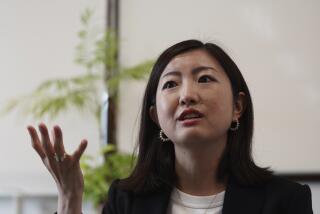Japan’s New Law Allows U.S. Attorneys to Practice There, but Problems Abound
- Share via
NEW YORK — The United States has begun to export one of its best-selling products--legal services--to Japan. But already, stiff competition is anticipated among U.S. law firms seeking Japanese clients.
Thirteen U.S. law firms, along with five British firms, have opened offices in Tokyo since the Japanese government enacted a new law last April to allow foreign lawyers to practice in Japan virtually for the first time ever, according to officials at the Japanese Ministry of Justice.
Ministry officials said in addition to those 18 companies, the ministry is examining applications filed by three other U.S. lawyers and one British lawyer. The ministry authorizes the opening of offices in the names of lawyers, not in the names of companies they represent.
Many of the U.S. law firms represented in Tokyo are based in New York, including Cleary, Gottlieb, Steen and Hamilton; Skadden, Arps, Slate, Meagher and Flom; Sullivan and Cromwell; Shearman and Sterling; Coudert Brothers, and Milbank, Tweed, Hadley and McCloy.
Arthur M. Mitchell of Coudert Brothers said the Japanese don’t need lawyers for domestic business transactions, but international transactions are different.
“Despite the recent events on the stock market, I think Japan continues to become more international and more outgoing, (and so there will be) great need for lawyers,” he said.
Mitchell Brock, who opened his own office in Tokyo representing Sullivan and Cromwell, said one reason for starting practice in Tokyo is to assist an outflow of a “great deal of capital from Japan.”
In the past, Sullivan and Cromwell acted for Nippon Life Insurance Co. in its investment in Shearson Lehman Brothers Inc. and for Goldman, Sachs and Co. when the Sumitomo Bank invested in the brokerage house, Brock said.
Isaac Shapiro at Skadden, Arps said his firm’s business with Japanese clients “has grown considerably.” Most notably, he said, the firm represented a group of Japanese financial institutions in their financial aid to the ailing BankAmerica Corp.
Michiko Ito of Kelley Drye and Warren in New York said her company has set up a Tokyo office because important decisions by its Japanese clients are always made in Tokyo.
Under the old Lawyers Law, the Japanese government said any person in Japan, regardless of nationality, may become qualified to practice law by successfully passing the “shiho shiken” or judicial examination.
However, the examination system itself had constituted a barrier to foreigners because of difficulties in passing the exam.
Usually, less than 500 of 20,000 applicants, about 2%, successfully pass the annual exam.
Of the successful applicants, 350 opt to become lawyers and 100 to become judges or public prosecutors, thus keeping the number of “active” lawyers in Japan almost unchanged at 12,000.
Responding to foreign calls to open its services market, Tokyo enforced the new law on foreign lawyers last April, under which foreign lawyers who do not have Japanese qualifications are able to offer legal services relating to foreign laws.
Prospects for foreign lawyers’ practice in Japan, however, are not always rosy because of remaining restrictions and the severe business environment.
U.S. lawyers complain that under the new law, they are barred from forming “partnerships” with their Japanese counterparts--a restriction that apparently resulted from pressure from some in the Japanese bar community who fear foreign intrusion into their business domain.
U.S. lawyers are also skeptical about a legal provision requiring lawyers to use only their own names on the plates of their offices, even though they represent their respective law firms.
The law is also based on the principle of reciprocity. In the United States, just four states--New York, California, Michigan and Hawaii--plus Washington, D.C., allow foreign lawyers to practice. Therefore, U.S. lawyers whose main jurisdiction is other than those areas cannot practice in Japan.
High office rent prices, caused by climbing land prices in downtown Tokyo, add hardship to foreign law offices.
“We would pay $100 per square foot in Tokyo. You would pay $30, $34 dollars here,” Coudert’s Mitchell said.
“So you have to have a level of business that is much higher in order to support the cost. I think there are going to be just a few firms that survive. The cost is the same for everybody.”
More to Read
Sign up for Essential California
The most important California stories and recommendations in your inbox every morning.
You may occasionally receive promotional content from the Los Angeles Times.













